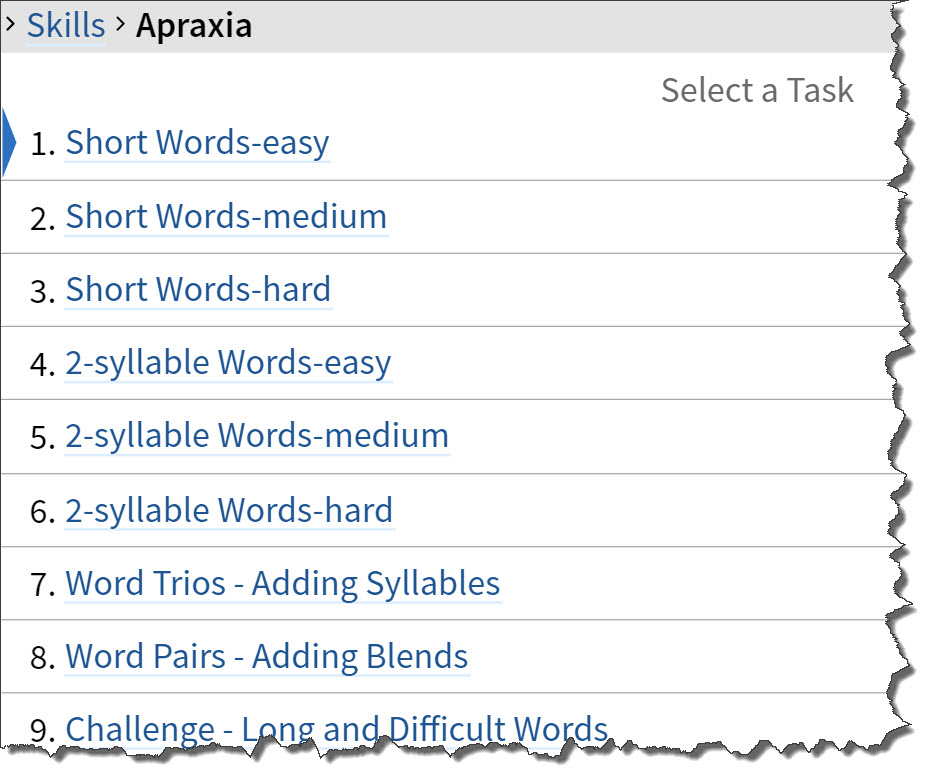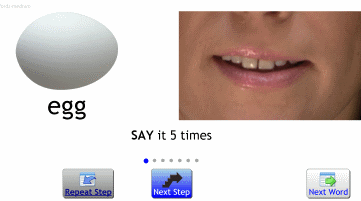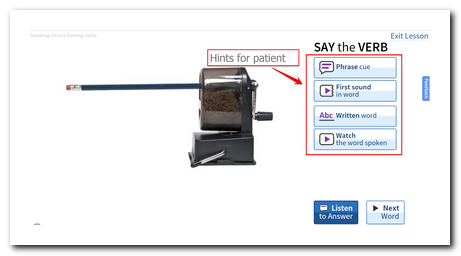How can I improve my speech after stroke or TBI
How to evaluate difficulty with speaking clearly (e.g., Apraxia, Dysarthria), and some exercises for home rehab
Is it difficulty with speech or language (word retrieval)?
Speech & Language pathologists treat speech and language. Difficulty with speaking could be caused by difficulty with language (word-retrieval difficulty) or by a speech-production problem. If the survivor can easily and clearly repeat back any word you say, but have difficulty speaking the word on their own it may be difficulty with word-retrieval (due to expressive aphasia, etc.).
 Speech
usually (and in this article) refers to the ability to move the mouth and
use the voice to form words. It can be impaired by Apraxia or
Dysarthria.
Speech
usually (and in this article) refers to the ability to move the mouth and
use the voice to form words. It can be impaired by Apraxia or
Dysarthria.
Dysarthria vs Apraxia
Dysarthria often results in muscle weakness or discordination. It often gets worse for whole sentences and may affect rate & rhythm.
Apraxia is difficulty with the brain telling the muscles how to move. The types of Apraxia that affect speech, Verbal & Oral Apraxia, affect the brains ability to tell the lips and tongue how to move. Often, spontaneous ("automatic") speech is clearer. View more detailed comparison of Dysarthria vs. Apraxia
Dysarthria is like you can't walk. Apraxia is like you can't dance. If you do not know which of the above you have, you can try exercises for both.
Start with something easy then work your way up through the levels below
Advance to the next level only if they can finish the current step ok. The goal here is just to see what they can do, not to challenge them yet. Let them see your mouth/tongue modeling the sounds (unless otherwise indicated below)- Can they repeat back a few simple words after you demonstrate (so they can watch your mouth)? maybe Way, We, Pay, Pea, Pie
- Repeat more useful (but harder words): Yes, No
- Repeat back harder words (still single syllable, but more words involving the tongue). The worksheets below have some example words like: pack, pad, pen, pill, pan.
-
Repeat
the above steps but without seeing your mouth
(i.e., they will only hear the the word).
You can cover your mouth with a book, or put a blind fold on them, or have them look away. etc. - Repeat but show them only the word and/or Picture (i.e, they will not hear them). Note: you should first make certain they can read at the word level (or retrieve and say the word for the picture). I covered how to evaluate reading-ability previously.
Apraxia Drills for Adults
- /p/ sounds
- /w/ sounds
- Sound Practice_ _b_.pdf
- Sound Practice_ _bl,br,cl,cr_.pdf
- Sound Practice_ _d_.pdf
Get more home therapy materials with our free Home Therapy Course or Clinician Resources
Interactive exercises more effective than worksheets
Oral Motor skills are very difficult to practice with worksheets. Survivors usually need an audio and/or visual model, so the caregiver should provide that. However, many survivors don't want to fail in front of anyone, especially a spouse or close family member. The ideal solution is to practice alone. I've created a solution for this.
My wife made me do it
Once upon a time there was a speech therapist who realized her patients needed more therapy than insurance was providing. So she asked her husband, a software engineer if he could help. So he created interactive treatment software for her to use at work. And her patients loved it. So did other therapists. So they made it available to everyone and he worked full time creating even more programs.
I am that software engineer. And I continue to work on that software today. It's used in the top Rehab Hospitals and all around the world.
Our latest program is MoreSpeech.com which provides unlimited practice for all areas of speech & language, including Apraxia (for articulation). You can create a free account and try it out. It's based on the Rosenbek Apraxia Hierarchy, which has been proven effective in research studies.
Try MoreSpeech.com (claim your free account)
Every day is an opportunity for recovery. Don't miss a single day.
- Surprising neuroscience discovery that makes recovery possible at any age.
- Why embracing failure leads to faster recovery.
- Unlock your survivor's communication needs in 4 steps.
- How to improve speech & language at the kitchen table.
Clay Nichols
Co-founder of
MoreSpeech and
Bungalow Software
for unlimited speech therapy at home and in the clinic.
 For
3 decades, Clay has helped patients, caregivers and speech pathologists
with speech & language software. He is not a speech-language
pathologist.
For
3 decades, Clay has helped patients, caregivers and speech pathologists
with speech & language software. He is not a speech-language
pathologist.
© 2025 Bungalow Software


